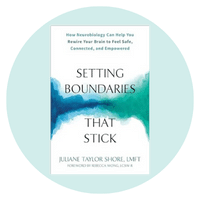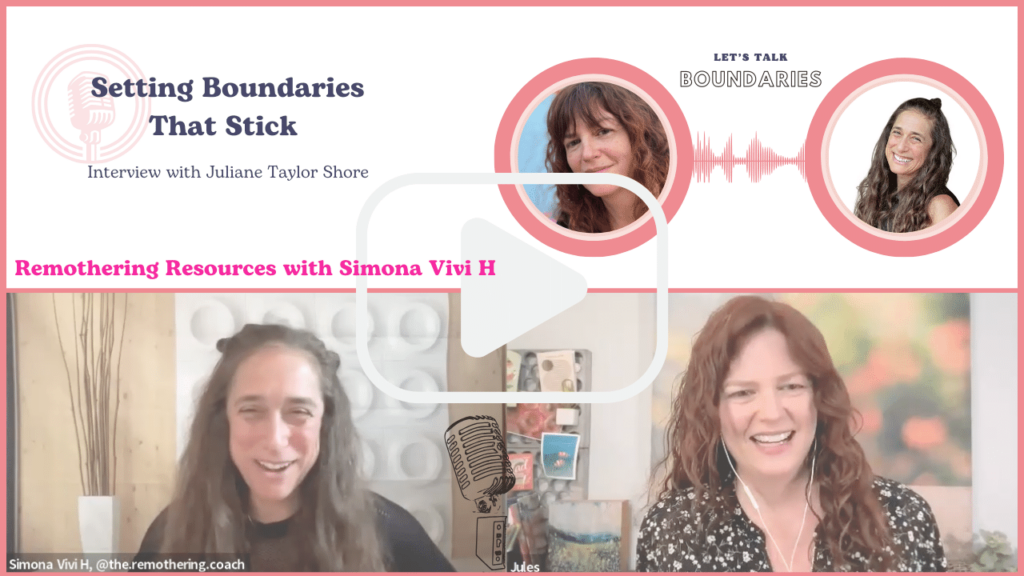Setting Boundaries That Stick
a conversation with Juliane Taylor Shore
Ever wonder why boundaries can feel hard, even when it seems like we “should” know what to do or say?
Thankfully, boundaries have become a hot topic in recent years, which means there are more resources available to us now that there used to be. The and/also of that is that knowing what to say doesn’t change our implicit beliefs about boundaries.
If our minds still associate boundaries with selfishness or negativity, merely knowing what to say falls short. In this in-depth conversation, I sit down with Juliane Taylor Shore (Jules) to dig into the neuroscience underlying our ability to set boundaries.
What I love about Jules’ work in this world is the way she weaves in neuroscience to explain why we do what we do so that there’s not a heaping pile of shame on top of hard boundary situations. Then, once we understand the “of course-ness” of why we are feeling the way we do, Jules offers a roadmap for finding our own unique path to establish and maintain boundaries with integrity and kindness.
In our conversation, Jules and I talk about her new book, Setting Boundaries that Stick, how neurobiology can help you rewire your brain to feel safe, connected, and empowered. We also cover:
- The neuroscience underneath our ability to set boundaries
- What is implicit memory, and why does it impact boundary-setting
- How “don’t be selfish” programming can show up when we go to set boundaries
- The difference between a direct request and setting a boundary
- Steps to setting a boundary
- Exploring the mentalization neural network
- Maintaining integrity in difficult conversations
- Our brains on self-judgement
- Bonus conversation: our brains are our body’s captive audience (a brief look at nervous systems)
Related Resources

Setting Boundaries That Stick (book)
How Neurobiology Can Help You Rewire Your Brain to Feel Safe, Connected, and Empowered
To learn more, visit JulianeTaylorShore.com

Implicit Memory: How Our Brain “Knows” a Thing (article)
Have you ever wondered how much of your daily reactions and beliefs are shaped by external influences, guiding your responses without your conscious awareness? Hint: understanding implicit memory is a key
Check out this article on Implicit Memory

Setting Boundaries That Stick: a conversation with Jules Taylor Shore (interview)
Watch the full interview. Click here
This really hit home—especially the part about how just knowing what to say doesn’t magically make setting boundaries any easier. I’ve had entire pretend conversations in my head that sound amazing… but when the moment comes, I either over-explain, apologize ten times, or suddenly become the most agreeable person alive. 🙃
Super refreshing to see boundaries talked about with compassion and science. Thanks!
Hi Kim,
You’re naming such a common experience—thank you for bringing the experience to life with your comment.
The pretend conversations? Yup. Then the moment comes… and instead of what we rehearsed, our well-worn strategies kick in. Over-explaining, over-apologizing, becoming the most agreeable person alive—it all makes such neurobiological sense.
So many of us know exactly what we want to say in theory—but in the moment, our systems are often trying to keep us safe in ways that were wired in long ago. Fortunately, neuroplasticity is on our side. And the fact that you’re noticing it? That’s a beautiful sign of where you are on your path forward.
I’m so glad this article resonated with you. Thank you for taking the time to say so.
If you’d like to keep exploring these themes, you might enjoy some of these companion pieces:
✨ Article: When Words Fail Us
If you’ve ever found yourself at a complete loss for words in the middle of a tricky conversation—or walked away only to think of the perfect response hours later—you may want to check out this article. It explores how social threat impacts our nervous system and how we can rewire for more ease through remothering. (Click Here)
💬 Articles on Boundaries
• Mastering Boundary Fundamentals
• How to Set a Boundary (Introductory Guide)
📘 Free Guidebook: The Language of Boundaries
Break free from the “boundaries are selfish” conditioning. Shine a light on your boundary blind spots with this free guide designed to support clarity and confidence.
Wishing you boundaries with ease.
From my heart to yours,
Simona